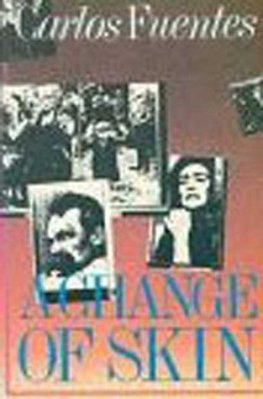Carlos Fuentes
Happy Families
Happy families are all alike; every unhappy family is unhappy in its own way.
LEO TOLSTOY, Anna Karenina

THE FATHER. Pastor Pagn knows how to wink. Hes a professional at winking. For him, winking an eye just one is a way to be courteous. All the people he deals with conclude their business with a wink. The bank manager when he approves a loan. The teller when he cashes a check. The administrator when he hands it to him. The cashier when he plays the fool and doesnt inspect it. The chiefs assistant when he tells him to go to the bank. The porter. The chauffeur. The gardener. The maid. Everybody winks at him. Headlights on cars wink, traffic lights, lightning in the sky, grass in the ground, eagles in the air, not to mention the planes that fly over the house of Pastor Pagn and his family the whole blessed day. The feline purr of the engines is interrupted only by the winking of the traffic on Avenida Revolucin. Pastor responds to them with his own wink, moved by the certainty that this is dictated by good manners. Now that hes on a pension, he thinks of himself as a professional winker who never opened both eyes at the same time, and when he did, it was already too late. One wink too many, he thinks in self-recrimination, one wink too many. He didnt retire. He was retired at the age of fifty-two. What could he complain about? Instead of punishing him, they gave him nice compensation. Along with early retirement came the gift of this house, not a great mansion but a decent place to live. A relic of the distant Aztec period in Mexico City, when the nationalistic architects of the 1930s decided to build houses that looked like Indian pyramids. In other words, the house tapered between the ground floor and the third floor, which was so narrow it was uninhabitable. But his daughter, Alma, found it ideal for her equally narrow life, devoted to surfing on the Internet and finding in its virtual world a necessary or sufficient amount of life so she did not have to leave the house but felt herself part of a vast invisible tribe connected to her, as she was connected to and stimulated by a universe that she thought the only one worthy to take possession of culture. The ground floor, really the basement, is occupied now by his son, Abel, who rejoined the family at the age of thirty-two after a failed attempt at leading an independent life. He came back proudly in order not to show that he was coming back contrite. Pastor received him without saying a word. As if nothing had happened. But Elvira, Pastors wife, reclaimed her son with signs of jubilation. No one remarked that Abel, by coming home, was admitting that at his age, the only way he could live was free of charge in the bosom of his family. Like a child. Except that the child accepts his situation with no problems. With joy.
THE MOTHER. Elvira Morales sang boleros. That was where Pastor Pagn met her, in a second-rate club near the Monumento a la Madre, on Avenida Villalongn. From the time she was very young, Elvira sang boleros at home, when she took a bath or helped to clean, and before she went to sleep. Songs were her prayers. They helped her endure the sad life of a daughter without a father and with a grieving mother. Nobody helped her. She made herself on her own, on her own she asked for a job at a club in Rosales, was taken on, liked it, then went to a better neighborhood and began to believe everything she was singing. The bolero isnt good to women. It calls the female a hypocrite, simply a hypocrite, and adds: perverse one, you deceived me. Elvira Morales, to give conviction to her songs, took on the guilt in the lyrics, wondered if her fatal sap really poisoned men and if her sex was the ivy of evil. She took the lyrics of boleros very seriously. Which was why she inspired enthusiasm, convinced her audience, and provoked applause night after night in the white spotlights that fortunately obscured the patrons faces. The public was the dark side of the moon, and Elvira Morales could give herself blindly to the passions she sang about, convinced they were true and that, since in song she was an adventuress on earth, she would not be one in real life. On the contrary, she let it be known that the price of her love was high, very high, and whoever wanted the honey of her mouth would pay for the sin in diamonds. Elvira Morales could sing melodically about the abjectness of her fate, but offstage she jealously preserved the springtime of her worth (it rhymed with adventuress on earth). After the show, she never mixed with the audience. She would return to her dressing room, change, and go home, where her unfortunate mother was waiting for her. The patrons invitations a drink, a dance, a little love were turned down, the flowers tossed into the trash, the small gifts returned. And the fact is that Elvira Morales, in every sense, took what she sang seriously. She knew through the bolero the dangers of life: lies, weariness, misery. But the lyrics authorized her to believe, to really believe, that true affection, with no lies, no wickedness, can be found when love is sincere.
THE DAUGHTER. Alma Pagn made an effort to find a place in the world. Let no one say she did not try. At eighteen, she realized she could not have a career. There was no time and no money. Secondary school was the most she could hope for, especially if the familys resources (so limited) would go to help her brother, Abel, at the university. Alma was a very attractive girl. Tall, slim, with long legs and a narrow waist, black hair in a helmet cut, a bust ample but not exaggerated, a matte complexion and veiled eyes, a partially open mouth, and a small, nervous nose, Alma seemed made to order for the recent occupation of aide at official ceremonies. Alma dressed just like the other three or six or twelve girls selected for business shows, international conferences, official ceremonies, in a white blouse and navy blue jacket and skirt, dark stockings, and high heels; her function was to stand quietly behind the speaker, refill glasses of water for panels, and never smile, much less disapprove of anything. Expel her emotions and be the perfect mannequin. One day she joined five colleagues at a charity event, and she saw herself as identical to them, all of them exactly the same, all differences erased. They were clones of one another. They had no other destiny but to be identical among themselves without ever being identical to themselves, to resemble one another in immobility and then disappear, retired because of their age, their weight, or a run in a black stocking. This idea horrified Alma Pagn. She quit, and since she was young and pretty, she found a job as a flight attendant on an airline that served the interior of the country. She didnt want to be far from her family and therefore didnt look for work on international flights. Perhaps she guessed her own destiny. That happens. And it also happens that on night flights the male passengers, as soon as the lights were lowered, took advantage of the situation and caressed her legs as she passed, or stared hungrily at her neckline, or simply pinched a buttock as she served drinks and Cokes. The drop that filled her glass of alcohol, of Coca-Cola to overflowing was the attack of a fat Yucatecan when she was coming out of the lavatory. He pushed her inside, closed the door, and began to paw at her and call her good-looking beauty. With a knee to his belly, Alma left the peninsular resident sitting on the toilet, pawing not Almas breasts but the paunch of his guayabera. Alma did not file a complaint. It was useless. The passenger was always right. They wouldnt do anything to the pigheaded Yucatecan. They would accuse her of being overly familiar with the passengers, and if she werent fired, shed be fined. This was why Alma withdrew from all activity in the world and settled into the top floor of her parents house with all the audiovisual equipment that from then on would constitute her secure, comfortable, and satisfactory universe. She had saved money and paid for the equipment herself.












